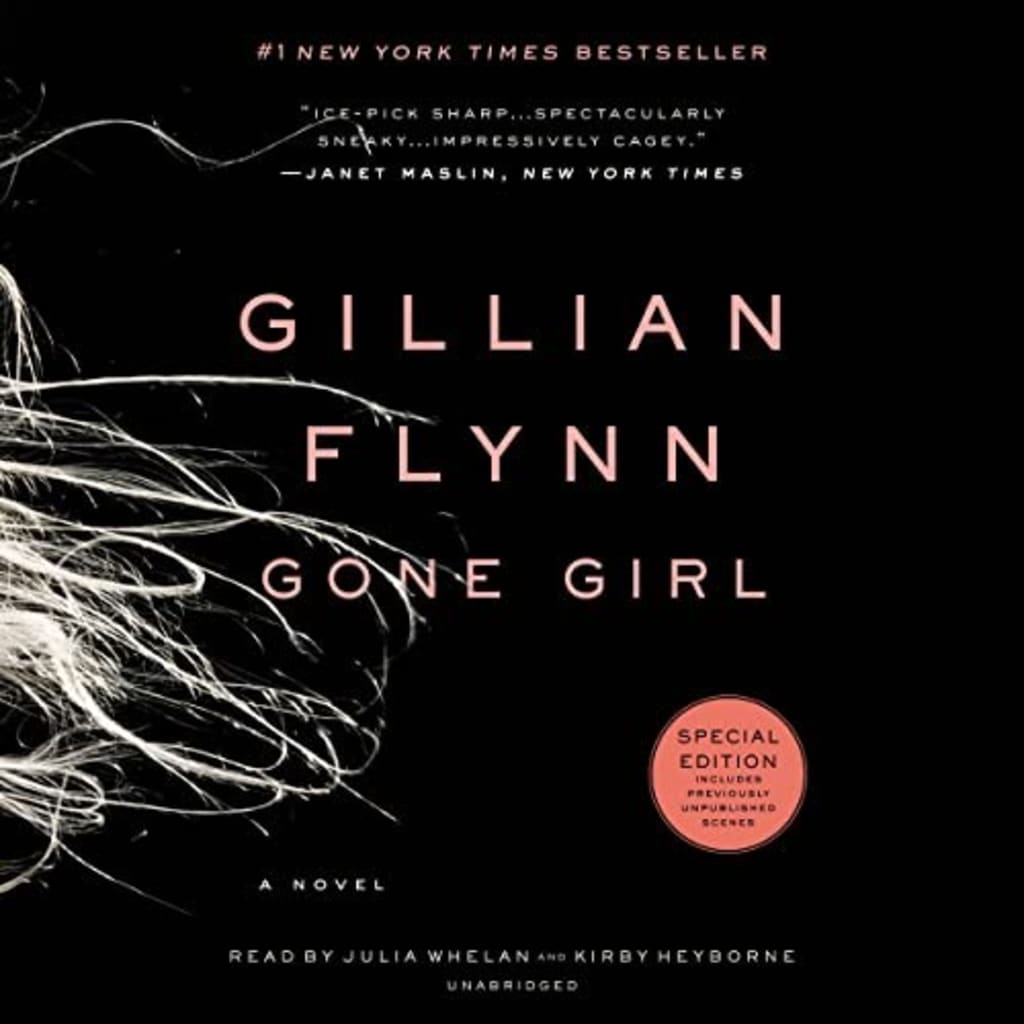"Gone Girl" by Gillian Flynn” Julia Whelan (Narrator), Kirby Heyborne (Narrator), Gillian Flynn (Author)
On a warm summer morning in North Carthage, Missouri, it is Nick and Amy Dunne’s fifth wedding anniversary. Presents are being wrapped and reservations are being made when Nick’s clever and beautiful wife disappears. Husband-of-the-Year Nick isn’t doing himself any favors with cringe-worthy daydreams about the slope and shape of his wife’s head, but passages from Amy's diary reveal the alpha-girl perfectionist could have put anyone dangerously on edge. Under mounting pressure from the police and the media—as well as Amy’s fiercely doting parents—the town golden boy parades an endless series of lies, deceits, and inappropriate behavior. Nick is oddly evasive, and he’s definitely bitter—but is he really a killer?

"Gone Girl" by Gillian Flynn is a psychological thriller that weaves a complex and twisted narrative exploring the intricacies of marriage, deception, and the media. Published in 2012, the novel quickly became a bestseller, captivating readers with its suspenseful plot and unreliable narrators. The story unfolds with a seemingly straightforward premise, but as layers are peeled back, it reveals a dark and compelling exploration of the human psyche.
The story kicks off with the mysterious disappearance of Amy Dunne on the morning of her fifth wedding anniversary. Amy's husband, Nick Dunne, becomes the primary suspect in her disappearance, especially when evidence at their home suggests foul play. The initial narrative is presented through a dual perspective, alternating between Nick's present-day experiences and Amy's entries in her meticulously kept diary, starting from the moment they first met.
As the investigation unfolds, the media frenzy intensifies, and public opinion sways against Nick. The novel masterfully plays with the perceptions of truth and fiction, blurring the lines between reality and the characters' carefully constructed facades. Amy's diary entries, initially portraying a picture-perfect marriage, start revealing cracks, hinting at a more complex and troubled relationship.
As the plot progresses, Flynn introduces unexpected twists that challenge readers' assumptions about the characters. Amy's disappearance takes on new dimensions, and Nick's involvement becomes increasingly enigmatic. The novel subverts traditional narrative structures, keeping readers on the edge of their seats with its unpredictable and darkly humorous storytelling.
Flynn's exploration of the media's role in shaping public perception is a central theme. The novel scrutinizes the way the media sensationalizes crime, turning personal tragedies into public spectacles. The characters' lives are dissected in the public eye, emphasizing the impact of societal expectations and judgments on their identities.
The characters themselves are deeply flawed, contributing to the novel's complexity. Nick and Amy are portrayed as unreliable narrators, each manipulating their own narrative to control how they are perceived. The layers of deception and manipulation add psychological depth to the story, creating a narrative puzzle that keeps readers engaged.
As the truth behind Amy's disappearance slowly unravels, the story takes a dark and unexpected turn. The calculated nature of Amy's actions comes to light, revealing a chilling and calculating personality beneath her initial façade. Nick's struggle to navigate the complexities of his marriage and the media circus becomes increasingly desperate.
The climax of "Gone Girl" is a gripping culmination of the psychological warfare between the characters. Flynn skillfully explores themes of identity, marriage, and societal expectations, leaving readers questioning their own assumptions and moral judgments. The narrative challenges the traditional constructs of the thriller genre, offering a thought-provoking and unsettling conclusion.
In conclusion, "Gone Girl" by Gillian Flynn is a dark and riveting psychological thriller that defies conventions. The novel's exploration of marriage, deception, and the media is executed with a skillful blend of suspense and psychological depth. The unreliable narrators, unexpected twists, and societal commentary contribute to the novel's lasting impact on readers. "Gone Girl" stands as a testament to Flynn's narrative prowess, leaving an indelible mark on the psychological thriller genre and inviting readers to question the complexities of human nature.






Comments
There are no comments for this story
Be the first to respond and start the conversation.